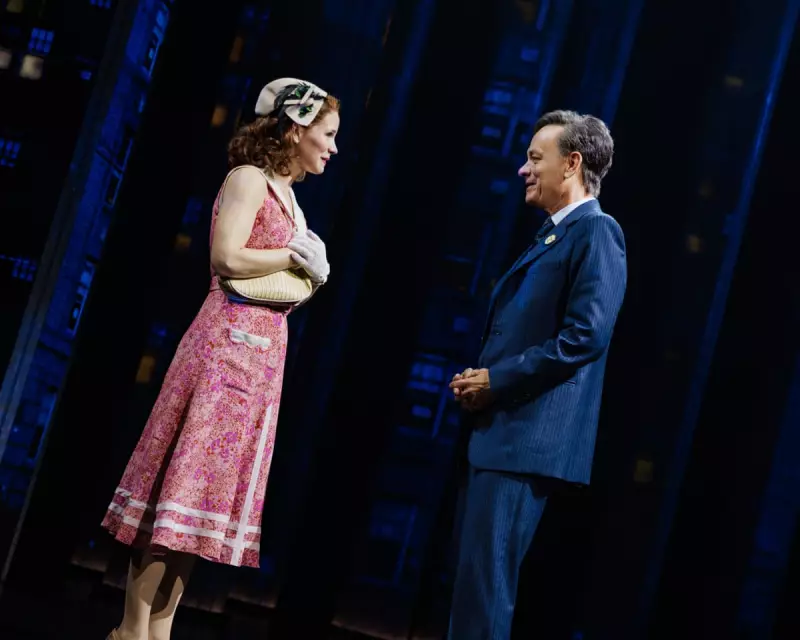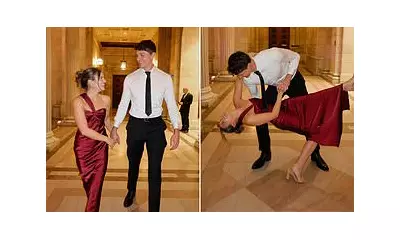
Hollywood icon Tom Hanks has made his long-awaited return to the New York stage in The World of Tomorrow, a time-travel romance that sees the beloved actor fully embracing his well-documented affection for days gone by. The production, running at The Shed in New York, pairs Hanks with Broadway star Kelli O'Hara in a charming exploration of nostalgia and impossible love.
A Star Drawn to the Past
Tom Hanks has always maintained a special connection to historical eras, both on and off screen. Throughout his career, he's frequently been compared to golden age star James Stewart, embodying that same wholesome American everyman quality that feels increasingly rare in modern cinema. His film choices reflect this tendency - in the last decade, he's appeared in just four contemporary films, preferring period pieces instead.
Beyond acting, Hanks's production work has consistently focused on historical subjects through acclaimed series like Band of Brothers and John Adams. His directorial debut, That Thing You Do!, was set in the 1960s, and his personal passion for typewriters is well-documented. This new play represents the natural culmination of these interests.
The Time Travel Premise
The World of Tomorrow introduces audiences to Bert, a scientist played by Hanks, who discovers a method of time travel with significant limitations. The technology is prohibitively expensive, accessible only to the wealthy elite, and can only transport people to specific locations during precise historical moments when certain 'echoes' permit passage.
Bert becomes obsessed with visiting the 1939 New York World's Fair, where he encounters Carmen, portrayed by the magnificent Kelli O'Hara. She's a local woman enjoying a day out with her precocious niece, played by Kayli Carter. What begins as fascination with the period's simpler pleasures - newspapers, affordable prices, and people saying 'swell' - quickly evolves into something deeper as Bert finds himself drawn back repeatedly to pursue this unexpected romance.
The play doesn't shy away from the darker realities lurking beneath the nostalgic surface. Bert's colleague M-Dash, brought to life by the wonderful Ruben Santiago-Hudson, provides crucial perspective when he notes that the 'good old days' weren't equally good for everyone. His observation proves accurate, as Bert notices that most service positions are filled by Black workers. The looming threat of World War II also casts a shadow, with Nazi symbolism appearing on pin badges throughout the fair.
Chemistry and Direction
While the first act struggles to fully justify Bert's increasingly dangerous and expensive trips to the past, the production finds its footing after intermission. O'Hara delivers a piercing monologue that elevates the romantic connection, making the audience genuine believers in this cross-temporal relationship.
Tony-winning director Kenny Leon demonstrates masterful control over the visual elements, employing rectangular pillars with video screens that seamlessly transition between futuristic conference rooms and modest Bronx apartments. Despite one minor technical hiccup with a stubborn prop - which Hanks himself helped resolve - the staging feels as polished as a major motion picture.
Hanks, last seen on the New York stage in Nora Ephron's 80s-set drama Lucky Guy, develops compelling chemistry with O'Hara, who perfectly captures period mannerisms without descending into caricature. Though comfortably within his wheelhouse, Hanks avoids the autopilot performance that sometimes plagues actors known for specific character types.
At over two hours, the production could benefit from some tightening, particularly regarding scenes featuring the niece and certain extraneous diner sequences. Nevertheless, The World of Tomorrow succeeds as a breezily enjoyable romance that might well be destined for a Hollywood adaptation, where further script refinements could perfect this already charming production.





